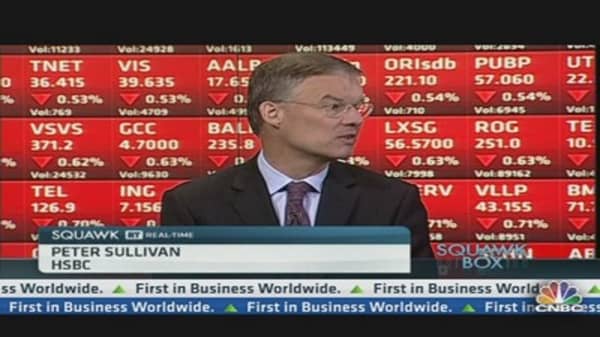European equities could surprise to the upside this year, with earnings growth making it a "buy-one-get-one-free market," Peter Sullivan, head of European equity strategy at HSBC, told CNBC on Wednesday.
The first quarter earnings season had been "unambiguously good" in the U.S and was "pretty balanced" in Europe, he said.
"That sets us up for high single-figure earnings growth this year in Europe, and maybe slipping into double figures in the U.S. That's pretty far above consensus… so we've got to a very interesting and unusual point where we might actually get some positive earnings surprises coming through."
Sullivan highlighted that earnings growth since 2000 had almost doubled, but that prices had remained at similar levels.
(Read More: Don't Bet on a 'Carney Put' for the UK: Pimco)
"So it's an almost buy-one-get-one-free market compared to 2000. Valuations are not fantastic at these levels… but within the market there will be pockets of opportunity," he said.
HSBC's equity team is chasing "sensible high yield", rather than yields of between 10 and 15 percent, as a result of the uncertainty surrounding central banks' stimulus programs, Sullivan said.
"We call this the marzipan yield… the 3-4 percent yields that just look good. Good solid companies that look good against bond yields at 2 percent."
Sectors including insurance, food retail and telecoms all have good risk/reward potential under these criteria, he said.
(Read More: Volatile US Bond Market a Major Risk for Global Economy: OECD)
But Sullivan warned that equity markets would see serious volatility when central banks confirm the end of their bond purchase programs.
Minutes of the Federal Reserve's latest meeting, released last week, revealed that a number of officials were open to tapering the bank's quantitative easing program next month. While on Tuesday, Pimco warned against assuming that the incoming governor of the Bank of England, Mark Carney, would expand monetary policy in the U.K.
"Just look at how extraordinary policy is," Sullivan added. "We've got interest rate numbers going back to 1694 in the U.K. and we're at a low - Isaac Newton was alive back then."
"It's asking a lot of policy makers to get out of this amazing, extraordinary position without some hiccups on the way. We should expect that – that's going to come straight through to the equity market. But we see that as volatility, not as the base case that there will be long-lasting error," he said.
(Read More: Profitability Has Become a Bad Word: Bundesbank Official)
- By CNBC's Katrina Bishop, follow her on Twitter @KatrinaBishop




